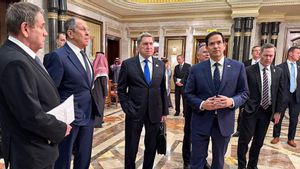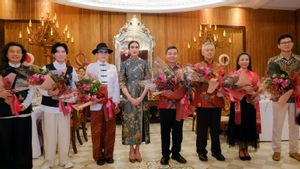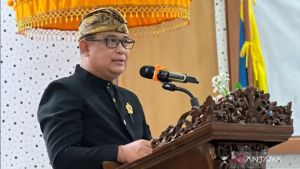An old friend once told a story about an employee of the Corruption Eradication Commission (KPK) who refused to serve bottled water at an event. As the organizer of the event, his friend was confused. However, lately, he found the answer to that incident. There is integrity at stake, even when the stakes are in the milliliter count of mineral water. We explored this through the eyes of Saut Situmorang, a retired KPK deputy chairman. Saut talks about building a 'shame culture' and how to build integrity within the KPK. How is the KPK today in Saut's eyes?
That morning, Thursday, February 27, we broke through heavy rain to reach the Otista area, East Jakarta. Our intention did not give up. There are important people we need to meet. We even arrived at the big white house on time, around 08.00 WIB.
"Please come in. You are waiting inside," said a man who had previously opened us the fence.
Inside, the host is warm and welcoming. "Hello, good morning, how are you?" We welcome his handshake with wet hands.
We were guided to a seat on a long brown sofa. Now, we are dealing with Saut Situmorang. The former deputy chairman of the KPK looked different that day. If we usually meet Saut after formal, that day Saut appeared relaxed with a collared shirt. However, it is just a form. Saut's warmth remains the same as we know him.
The chat was even started by Saut. He told a story about his activities after becoming Deputy Chairman of the KPK. The story that immediately broke our focus, which since entering the house was diverted to a series of photos on the wall. The displays are dominated by photos of Saut with his family. Some of them are photos of Saut with other leaders at the KPK.

Saut tells a story about the Bhinneka House, a place that he forms as a place for people with anxiety to uphold justice and other ideas that breathe Pancasila. Rumah Bhinneka is a new battlefield for Saut, who for the past five years has served in the anti-corruption agency.
"Sometimes, I still feel like being a leader. (Jetlag) yes. Meeting the KPK spokesman (Acting KPK Spokesperson for Enforcement, Ali Fikri), I said, 'Uh, you study again tomorrow'. But, I remember , you know, I'm not the leader anymore, "said Saut with a laugh.
Saut tells the story of his early establishment of Rumah Bhinneka. According to Saut, the Bhinneka House was founded from his anxiety seeing so many injustices. The conflicts of interest that unfold in the ruling order often result in injustice in other layers of life. According to Saut, this injustice is the cause of rampant corruption in this country.
Regarding the opinion that calls Rumah Bhinneka as his vehicle for advancing into practical politics, Saut denies it. According to Saut, until that day, he had no intention of taking part in practical political practices. A commendable choice. Because, it's not really a difficult thing if Saut wants to. Several political parties (parpol) were even reported to have invited him to join.
Take care of yourself
Back to the question of how Saut led the KPK with Agus Rahardjo, Basaria Panjaitan, Alexander Marwata, and Laode Muhammad Syarief. Saut remembers very well the integrity value instilled in the KPK. According to Saut, there are strict rules governing the behavior of KPK employees, from the lowest to the top.
Rules are woven into a comprehensive system capable of protecting KPK employees from disintegrating attitudes. Saut agreed with a friend's story about a KPK employee who refused to accept mineral water. Saut himself acknowledged how KPK leaders were accustomed to preparing their own drinks when attending events. Don't make room for conflicts of interest that could tarnish integrity, you see.
"We just go everywhere there are rules. We can even get scolded by the internal supervisor. Where to go. If we just go, for example from the airport to the venue (event), we have already been arranged. Because apart from security, it is aesthetics and ethics. ethics. Especially the ethics. "
Regarding taking care of himself, Saut told a story. One time, Saut and his KPK entourage attended an anti-corruption briefing in an area. As usual, Saut and his entourage did not touch any food at the event. However, recently there was a report that said the committee had allocated IDR 4 million for Saut and his entourage's banquet.
Apparently, the Rp4 million budget was only a trick by corrupt elements in the event organizers. This kind of risk, according to Saut, is important to avoid. Not only disrupting efforts to eradicate corruption, the organizers also dragged the KPK into corrupt actions. "That's why I always refuse. I don't want to be invited to eat because of certain risks," he said.
Good man at the KPK
"Anyone who joins the KPK will be a good person." This expression is well known. Yes, with all the systems and rules that have been preserved from generation to generation of leadership, the KPK has become one of the institutions that has successfully demonstrated its reliability in maintaining integrity. This was admitted by Saut. According to him, there is one important key besides the system and rules: a culture of shame.
Saut said that the KPK environment really maintains a culture of shame. In other words, everyone is used to maintaining shame. Shame when tarnishing integrity, shame when violating authority, to embarrassment to take something that is not right. And if there is something that many people outside the KPK are most likely to practice, it is the culture of shame that Saut says.
During his time as Deputy Chair of the KPK, Saut said he could take many values. According to him, for those who have offices at the KPK, a culture of shame goes hand in hand with the awareness that the KPK's performance is a big responsibility which is widely highlighted by the public. Next, Saut delivered a statement that invited our reflections for years of coverage at the KPK.
"The values that already exist in the KPK, I think are not only in the employees. Your own events (journalists) are affected. Never mind the KPK, journalists at the KPK are aware that they do not conflict of interest, protect themselves. , "said Saut.

In addition to those already in office, the KPK system was also built to screen those who would join in the service to eradicate corruption. There is a special standard made by the KPK to elect people. Standardization is not only about integrity, but also academically. For Saut, this is where the KPK leadership plays an important role. Leaders must ensure integrity preservation systems are maintained.
"Now, now, I don't know if it's still like that. The values in the KPK are far from a conflict of interest ... When you inspire your team with no conflict of interest, all those in the carriage group must participate. . Its leadership is what is important at the KPK, "he said.
New KPK
The Corruption Eradication Commission Law (UU) Number 19 of 2019 is clearly a test for the preservation of the integrity of the people at the KPK. In Saut's eyes, many of the mandates in the new KPK Law contradict the good values that anti-graft institutions have maintained so far. Saut did not come from a sound. The trend of system changes brought about by the new KPK Law, according to Saut, can be seen from changes in strategy and case handling.
Regarding the termination of a case within two years, for example. According to Law 19/2019, an investigation can be legally stopped if it has passed two years since being put on trial. This is clearly paradoxical, considering that the criminal code actually regulates the expiration limit for a legal case is 18 years. Saut also criticized the prosecution by the KPK. That there is no reason to relax the enforcement.
"So, what distinguishes it is practical, the style is different. But, next, the value also shifts. This is for example, the value for announcing the termination of an investigation. That is not allowed. It's clandestine. That cannot be spoken to the public. Because, the value, openness to the public is different. That's when it is investigated. So, slowly, if we are not careful, the KPK is dead. Yes, it (KPK) will be the same as other (institutions). "
Saut Situmorang
Saut's tone changed when the discussion entered this realm. The KPK is in grave danger, it seems. Apart from the mandate of the new law, the leadership of the Corruption Eradication Commission for today's period is clearly worried. This was mentioned by Saut. The issue of public openness, for example. He reminded the KPK to maintain public openness. In addition, Saut also highlighted the potential for interventions - through leadership - that could interfere with corruption eradication work. The independence of the KPK is threatened.
"Well, this is what we must be careful with. We have to look at each person in detail. Who, here, is being remotely remote," he said with a smile.
Saut's concern is not random. The survey institute Indo Barometer released survey results that showed a decline in the level of public trust in the KPK. If previously anti-graft institutions consistently occupied the top three institutions with the highest level of trust, during the leadership of Firli Bahuri cs, the KPK was thrown into fourth position with a confidence percentage of 81.8 percent.
"You have to maintain the existing values. You have to maintain it. Maybe there will be debates, maybe there are people who are pretentious, but not for adults. We know what is good and what is not. It's just a matter of method. So you stay there, hope. we just hold that value there must be a risk, that's why there are 9 values, there are those who are brave, don't be afraid. Don't be afraid as long as you uphold justice, don't hesitate there. "
Saut Situmorang
The English, Chinese, Japanese, Arabic, and French versions are automatically generated by the AI. So there may still be inaccuracies in translating, please always see Indonesian as our main language. (system supported by DigitalSiber.id)
![[LEGAL] Saut Situmorang | About Maintaining Integrity At The KPK](https://imgsrv2.voi.id/b_ZH1LyxGM6hqm3P49UwXmwVV8Mugqaj3DGv4CnlPHg/auto/1200/675/sm/1/bG9jYWw6Ly8vcHVibGlzaGVycy9kYWVmNDY2Mi1mODU5LTQ3MGUtYTgxMy03YjhlZDE1M2QxMzYvMjAyMDAzMTExOTU5LW1haW4uY3JvcHBlZF8xNTgzOTMxNjQ0LkpQRw.jpg)












